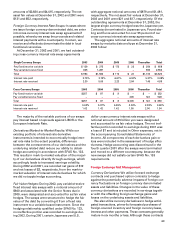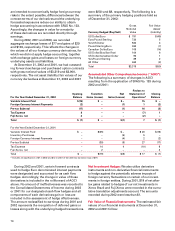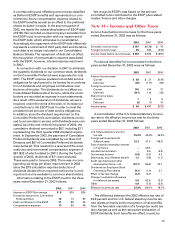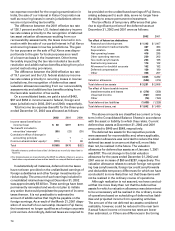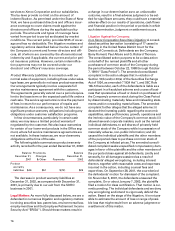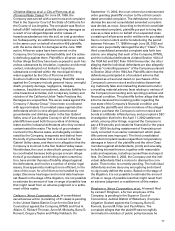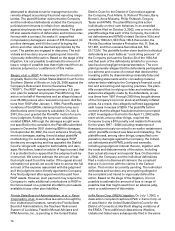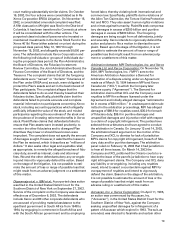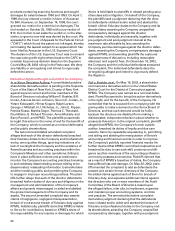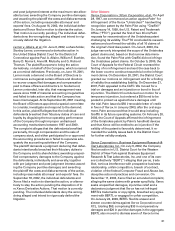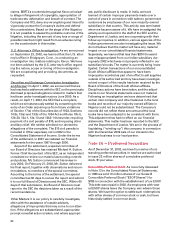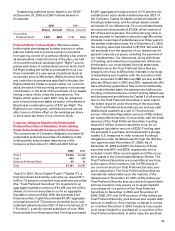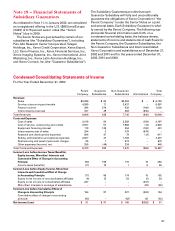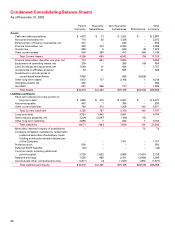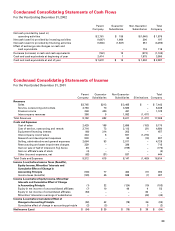Xerox 2002 Annual Report Download - page 81
Download and view the complete annual report
Please find page 81 of the 2002 Xerox annual report below. You can navigate through the pages in the report by either clicking on the pages listed below, or by using the keyword search tool below to find specific information within the annual report.
court making substantially similar claims. On October
16, 2002, the four actions were consolidated as In Re
Xerox Corporation ERISA Litigation. On November 15,
2002, a consolidated amended complaint was filed.
A fifth class action (Wright) was filed in the District of
Columbia. It has been transferred to Connecticut where
it will be consolidated with the other actions. The
purported class includes all persons who invested or
maintained investments in the Xerox Stock Fund in the
Xerox 401(k) Plans (either salaried or union) during the
proposed class period, May 12, 1997 through
November 15, 2002, and allegedly exceeds 50,000 per-
sons. The defendants include Xerox Corporation and
the following individuals or groups of individuals dur-
ing the proposed class period: the Plan Administrator,
the Board of Directors, the Fiduciary Investment
Review Committee, the Joint Administrative Board, the
Finance Committee of the Board of Directors, and the
Treasurer. The complaint claims that all the foregoing
defendants were “named” or “de facto” fiduciaries of
the Plan under ERISA and, as such, were obligated to
protect the Plan’s assets and act in the best interest of
Plan participants. The complaint alleges that the
defendants failed to do so and thereby breached their
fiduciary duties. Specifically, plaintiffs claim that the
defendants failed to provide accurate and complete
material information to participants concerning Xerox
stock, including accounting practices which allegedly
artificially inflated the value of the stock, and misled
participants regarding the soundness of the stock and
the prudence of investing retirement benefits in Xerox
stock. Plaintiff also claims that defendants failed to
ensure that Plan assets were invested prudently, to
monitor the other fiduciaries and to disregard Plan
directives they knew or should have known were
imprudent. The complaint does not specify the amount
of damages sought. However, it asks that the losses to
the Plan be restored, which it describes as “millions of
dollars.” It also seeks other legal and equitable relief,
as appropriate, to remedy the alleged breaches of fidu-
ciary duty, as well as interest, costs and attorneys’
fees. We and the other defendants deny any wrongdo-
ing and intend to vigorously defend the action. Based
on the stage of the litigation, it is not possible to esti-
mate the amount of loss or range of possible loss that
might result from an adverse judgment or a settlement
of this matter.
Digwamaje et al. v. IBM et al.: A purported class action
was filed in the United States District Court for the
Southern District of New York on September 27, 2002.
Service of the complaint on the Company was deemed
effective as of December 6, 2002. The defendants
include Xerox and 80 other corporate defendants who
are accused of providing material assistance to the
apartheid government in South Africa from 1948 to
1994, by engaging in commerce in South Africa and
with the South African government and by employing
forced labor, thereby violating both international and
common law. Specifically, plaintiffs claim violations of
the Alien Tort Claims Act, the Torture Victims Protection
Act and RICO. They also assert human rights violations
and crimes against humanity. Plaintiffs seek compensa-
tory damages in excess of $200 billion and punitive
damages in excess of $200 billion. The foregoing
damages are being sought from all defendants, jointly
and severally. Xerox intends to vigorously defend the
action and plans to file a motion to dismiss the com-
plaint. Based upon the stage of the litigation, it is not
possible to estimate the amount of loss or range of
possible loss that might result from an adverse judg-
ment or a settlement of this matter.
Arbitration between MPI Technologies, Inc. and Xerox
Canada Ltd. and Xerox Corporation: On November 15,
2001, MPI Technologies, Inc. (“MPI”) sent to the
American Arbitration Association a Demand for
Arbitration of a dispute arising under an Agreement
made as of March 15, 1994 between MPI and Xerox
Canada Ltd. (“XCL”) to which the Company later
became a party (“Agreement”). The Demand for
Arbitration claimed that XCL and the Company owed
royalties to MPI for software licensed under the
Agreement and initially alleged damages “estimated to
be in excess of $30 million.” In a subsequent claim sub-
mitted in the arbitration proceedings, MPI has alleged
damages of $68.9 for royalties owed, $35.0 for breach
of fiduciary duty, $35.0 in punitive damages and
unspecified damages and injunctive relief with respect
to a claim of copyright infringement. The parties have
selected three arbitrators and have agreed to conduct
the arbitration in Canada. On January 13 and 14, 2003,
the arbitrators heard argument on the motion of the
Company and XCL to dismiss for lack of jurisdiction
MPI’s claims for copyright infringement, breach of fidu-
ciary duty and for punitive damages. The arbitration
panel ruled on February 14, 2003 that it had jurisdiction
to hear all three issues. On March 14, 2003 the
Company and XCL petitioned the Ontario courts to re-
decide the issue of the panel’s jurisdiction to hear copy-
right infringement claims. The Company and XCL deny
any liability or wrongdoing, including any royalties
owed, intend to assert a counterclaim against MPI for
overpayment of royalties and intend to vigorously
defend the claim. Based on the stage of the arbitration,
it is not possible to estimate the amount of loss or the
range of possible loss that might result from an
adverse ruling or a settlement of this matter.
Accuscan, Inc. v. Xerox Corporation: On April 11, 1996,
an action was commenced by Accuscan, Inc.
(“Accuscan”), in the United States District Court for the
Southern District of New York, against the Company
seeking unspecified damages for infringement of a
patent of Accuscan which expired in 1993. The suit, as
amended, was directed to facsimile and certain other
79


